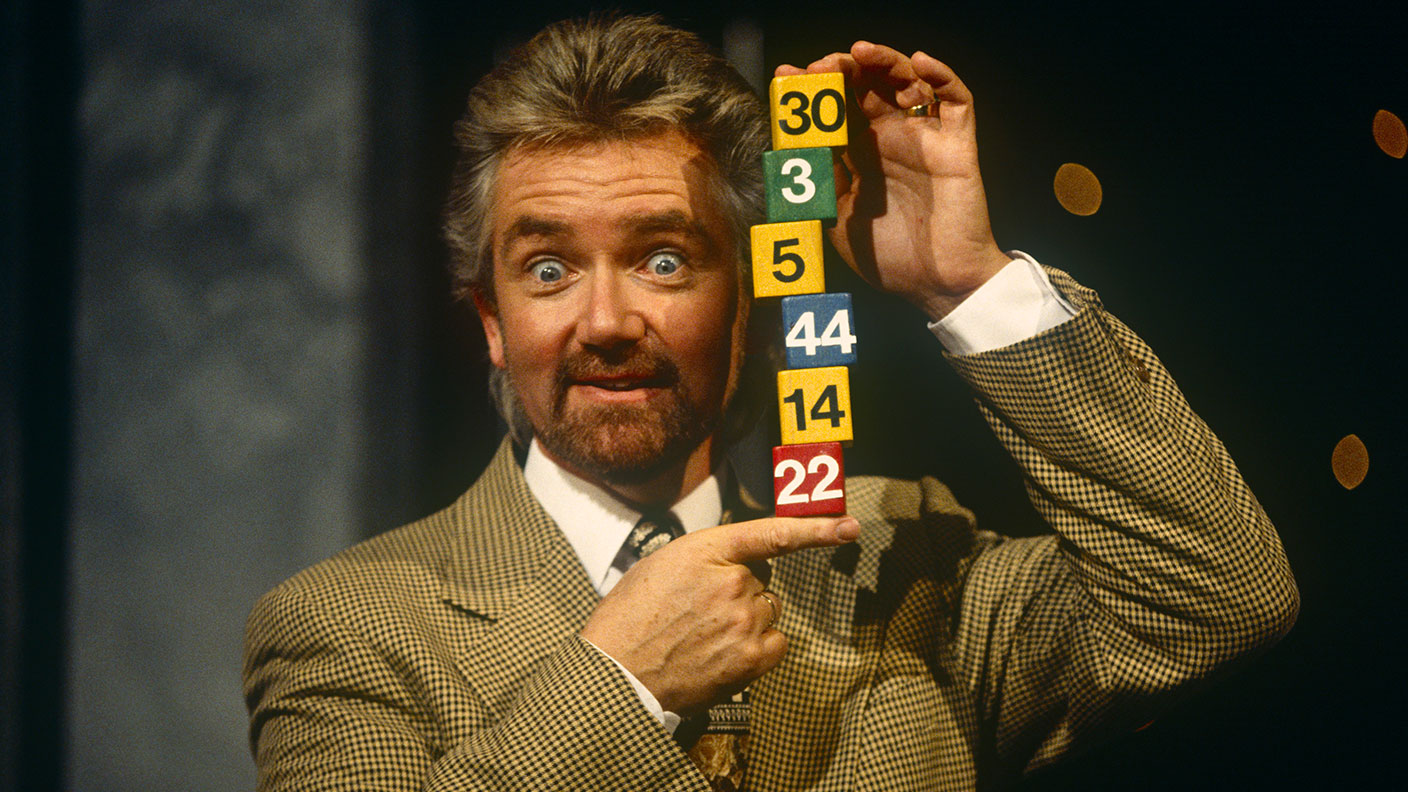
Get the latest financial news, insights and expert analysis from our award-winning MoneyWeek team, to help you understand what really matters when it comes to your finances.
You are now subscribed
Your newsletter sign-up was successful
Want to add more newsletters?
“Release the balls!” On this day in 1994, in a one-hour TV extravaganza hosted by Saturday evening TV institution Noel Edmonds, 18-year-old Deborah Walsh pressed the button that inaugurated the UK's National Lottery. 22 million people watched as the numbers were called: in ascending order, they were 3, 5, 14, 22, 30, 44, and the bonus ball was number 10.
The frequency of draws was doubled in February 1997 when a Wednesday draw was added. The use of the same range of numbers 1-49 was controversial, as it encouraged people to play who might otherwise not have, in case “their” numbers came up. Some wanted numbers 51-99 to be used instead.
The odds of winning are, famously, 14 million to one (actually 13,983,816 to one). But in that first week, seven people shared the jackpot, scooping £839,254 each.
Try 6 free issues of MoneyWeek today
Get unparalleled financial insight, analysis and expert opinion you can profit from.

Sign up to Money Morning
Don't miss the latest investment and personal finances news, market analysis, plus money-saving tips with our free twice-daily newsletter
Don't miss the latest investment and personal finances news, market analysis, plus money-saving tips with our free twice-daily newsletter
However, this was not England's first National Lottery. That took place on 11 January 1569. In 1566 Queen Elizabeth instructed Sir John Spencer to set up a lottery to raise funds to be "employed to good and public acts and beneficially for our realm and our subjects". 400,000 tickets were sold at ten shillings a pop for the chance of a £5,000 jackpot. Other prizes included immunity from arrest for a week, and free entry to libraries. Collectors got sixpence a ticket.
And in 1694, the English State Lottery was launched. Also called the “Million Lottery”, 100,000 tickets were sold at £10 each, partly to fund war against France (who else?).
Get the latest financial news, insights and expert analysis from our award-winning MoneyWeek team, to help you understand what really matters when it comes to your finances.

-
 Investing in Taiwan: profit from the rise of Asia’s Silicon Valley
Investing in Taiwan: profit from the rise of Asia’s Silicon ValleyTaiwan has become a technology manufacturing powerhouse. Smart investors should buy in now, says Matthew Partridge
-
 ‘Why you should mix bitcoin and gold’
‘Why you should mix bitcoin and gold’Opinion Bitcoin and gold are both monetary assets and tend to move in opposite directions. Here's why you should hold both
-
 31 August 1957: the Federation of Malaya declares independence from the UK
31 August 1957: the Federation of Malaya declares independence from the UKFeatures On this day in 1957, after ten years of preparation, the Federation of Malaya became an independent nation.
-
 13 April 1960: the first satellite navigation system is launched
13 April 1960: the first satellite navigation system is launchedFeatures On this day in 1960, Nasa sent the Transit 1B satellite into orbit to provide positioning for the US Navy’s fleet of Polaris ballistic missile submarines.
-
 9 April 1838: National Gallery opens in Trafalgar Square
9 April 1838: National Gallery opens in Trafalgar SquareFeatures On this day in 1838, William Wilkins’ new National Gallery building in Trafalgar Square opened to the public.
-
3 March 1962: British Antarctic Territory is created
Features On this day in 1962, Britain formed the British Antarctic Territory administered from the Falkland Islands.
-
10 March 2000: the dotcom bubble peaks
Features Tech mania fanned by the dawning of the internet age inflated the dotcom bubble to maximum extent, on this day in 2000.
-
9 March 1776: Adam Smith publishes 'The Wealth of Nations'
Features On this day in 1776, Adam Smith, the “father of modern economics”, published his hugely influential book The Wealth of Nations.
-
 8 March 1817: the New York Stock Exchange is formed
8 March 1817: the New York Stock Exchange is formedFeatures On this day in 1817, a group of brokers moved out of a New York coffee house to form what would become the biggest stock exchange in the world.
-
7 March 1969: Queen Elizabeth II officially opens the Victoria Line
Features On this day in 1969, Queen Elizabeth II took only her second trip on the tube to officially open the underground’s newest line – the Victoria Line.
